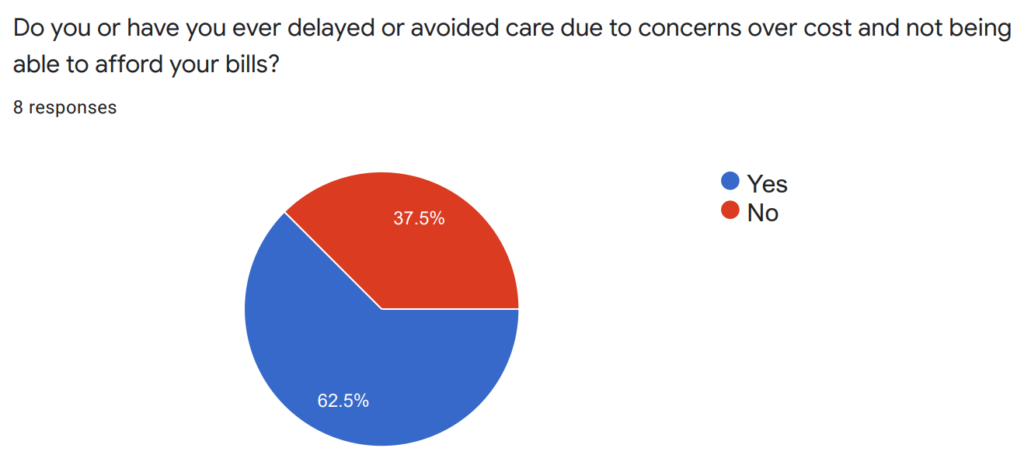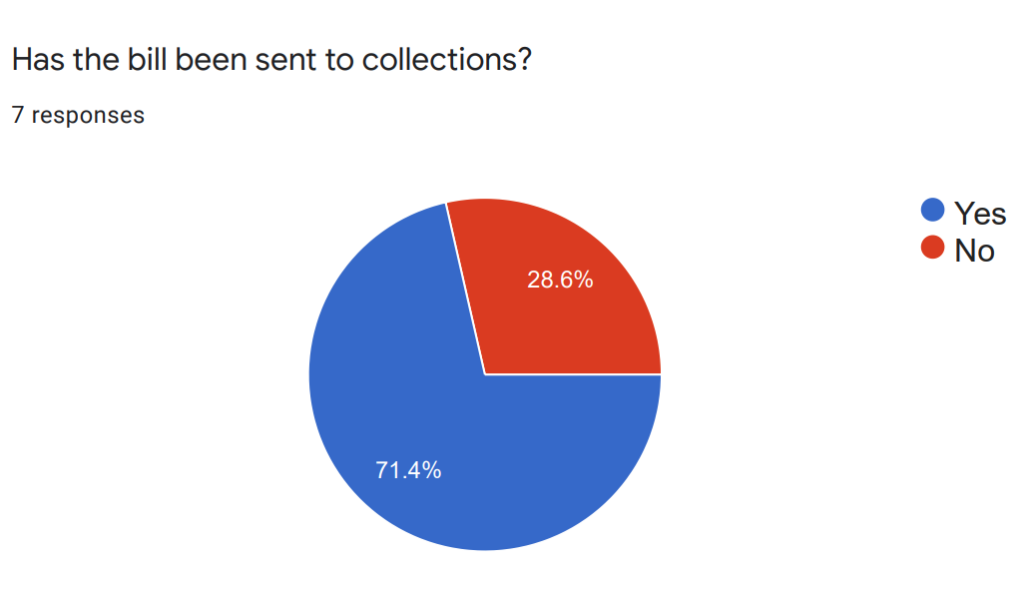It’s a new year at the Gold Dome, though technically it’s really the start of the tail end of the two-year biennium. So happy half new year in Georgia politics?…
Blog ()
- Home
- >
- 2021
Year: 2021

In the spring of this year, Georgians for a Healthy Future, Georgia Watch, and SOWEGA Rising launched a project in Southwest Georgia to address the burden of medical debt. Southwest Georgia, including the Albany area, experiences medical debt at a higher rate than the rest of Georgia and the country. In Dougherty County, 22% of residents have a medical debt in collections, compared to 19% for Georgia and 15% nationally. This debt also disproportionately impacts communities of color. In Dougherty County, 25% of Black residents have a medical debt in collections, compared to 21% in Georgia and 17% nationally (Urban Institute, 2020).
Medical debt can have a profound impact on the quality of a person’s life. Studies have found that medical debt is associated with a decreased use of health services, especially among low-income individuals who often become sicker while delaying care, which increases the cost of their care (Crawford, 2021). These impacts can trickle down to affect the health of the entire community.
To better understand both the individual and community impacts of medical debt, Georgians for a Healthy Future, Georgia Watch, and SOWEGA Rising have used several outreach methods to invite residents of southwest Georgia to share their stories and feedback on experiences with medical debt. Since May of 2021, SOWEGA Rising has organized in-person listening sessions and Facebook Live virtual events to help individuals share their experiences with accessing and affording care in the community, including sharing whether they currently have unpaid medical bills, bills in collections, and how those bills are impacting their lives. So far, we’ve conducted seven listening sessions, and the experiences shared with us show that southwest Georgia residents are struggling to afford their care. Over 60% of those we spoke to reported delaying or avoiding care due to cost concerns, and over 70% reported an outstanding medical bill that had been sent to collections.


In October, we launched the Dish the Debt campaign in a focused effort to encourage community members, especially people of color who have been disproportionately impacted by medical debt, to share their encounters with medical bills, medical debt, and unfair debt collection practices. The campaign included social media posts throughout the month that talked about the issue of medical debt and explained why it’s so crucial for those affected by medical debt in southwest Georgia to share their story. Each post linked to a story collection form on Georgia Watch’s website where individuals could share their stories and contact information for follow-up.
A more recent effort to engage the southwest Georgia community to share their experiences with medical debt came during Georgians for a Healthy Future’s Southwest Georgia Health Care Affordability forum. During the forum, speakers from Albany Area Primary Care, Samaritan Clinic, and Valley Healthcare (local clinics that provide free or low-cost care to the community) shared how high medical costs negatively impact southwest Georgia. GHF also shared data on the disproportionate share of medical debt among communities of color in southwest Georgia during the forum. Each organization that spoke during the forum is also sharing links to the medical debt story collection form to elicit more stories from the southwest Georgia community.
Our organizations will continue to create opportunities for community feedback and stories regarding medical debt in southwest Georgia. We will ramp up our community feedback and story collection efforts in 2022, starting with a dual listening session and Affordable Care Act enrollment event in Cuthbert. We invite anyone interested to join us on January 13th, from 5 – 8 pm. Location in Cuthbert TBD.
We know that personal stories are critical to making lasting legislative and policy changes. While data on medical debt and the disproportionate impact on communities of color is deeply concerning, sharing stories creates a connection between those impacted by medical debt and Georgia’s decision-makers in a way that data cannot. We hope to use these stories, alongside data, to encourage hospital systems and lawmakers to enact policies that will protect Georgia communities from the crushing impacts of high health care costs and medical debt.
References
Crawford, K (2021). Stanford News: Stanford study finds medical debt is a double whammy for the poor. https://news.stanford.edu/2021/10/07/study-finds-medical-debt-double-whammy-poor/
Urban Institute (2020). Debt in America: An Interactive Map.https://apps.urban.org/features/debt-interactive-map/?type=overall&variable=pct_debt_collections
“Georgians for a Healthy Future praises our champions in the U.S. House of Representatives for their passage of the Build Back Better Act. This move brings uninsured Georgians one-step closer to a 4-year coverage gap fix. We encourage the Senate to urgently take up and approve this legislation so Georgians who have been left behind for almost a decade can easily & affordably access health care—like people just like them in 38 other states.”

The high cost of medical care has long been a concern for consumers and a frequent topic of conversation among policymakers and industry leaders. Therefore, it’s no surprise to learn that many Georgians struggle to pay for health care or worry about their ability to pay for care in the future. A new survey conducted by Altarum Healthcare Value Hub, in consultation with Georgians for a Healthy Future, gives surprising new data on exactly how much Georgians struggle with the cost of healthcare.
The purpose of Altarum’s Consumer Healthcare Experience State Survey (CHESS) is to provide advocates, policymakers, and industry leaders with a better understanding of consumers’ struggles with health care costs, reveal the cost-drivers that need to be addressed in Georgia and provide support for system changes and policy solutions to improve health care affordability for consumers.
The Georgia CHESS revealed the majority of Georgians struggle with health care affordability burdens. Many Georgians are uninsured, delay needed care, or struggle to pay their medical bills due to high costs. Even more Georgians are worried about affording care in the future, especially care related to aging or medical emergencies. These results indicate the need for policymakers and stakeholders to address high costs across all areas of health care – from coverage to care to prescription drugs Additionally, consumers need more protection from high health care costs and robust, easy-to-understand tools to navigate the costs associated with care.
The survey data also unveil the need and support for Georgia lawmakers to act to relieve cost concerns for Georgians. Lawmakers can apply the CHESS results to their efforts in the 2022 legislative session, using the information to pass laws that eliminate cost as a barrier to care for Georgians, protect Georgians from rising health care costs, and require system-level changes so consumers can better tell what the true cost of their care will be.
If you would like to learn more about the Georgia results and the affordability burdens faced by Georgians, we invite you to join us on October 14th for “Coming Up Short: Affordability, Access, and Policy Fixes for Georgians,” where you’ll hear from experts about Georgia’s results and ways to address health care spending.

This month, GHF welcomed Alex McDoniel as our new Strategic Communications Manager. Alex will lead GHF’s communications, marketing and public relations efforts.
(more…)By: Knetta Adkins

On August 2nd, I had the opportunity to meet with Secretary Xavier Becerra, the 25th Secretary of the Department of Health and Human Services. During his August trip to Georgia, Secretary Becerra hosted a roundtable with community leaders to hear about the health care concerns and challenges most affecting Georgians. Congresswomen Carolyn Bordeaux, Lucy McBath, and Nikema Williams, state Representative Matthew Wilson, and Mayor Keisha Lance Bottoms participated in the roundtable, as well as representatives from Community Catalyst, Protect Our Care Georgia, and others. It was an exciting moment to represent Georgians for a Healthy Future and share on behalf of the marginalized Georgians for whom we advocate.
(more…)
In June of this year, the Centers for Medicaid and Medicare Services (CMS) approved a change for Georgia’s Medicaid program that shifts how school nurses can bill for their services. Before June, Medicaid would only pay for school health services, including nursing services, if the student had a special education plan called an Individualized Education Program (IEP). IEPs are maps that lay out a program of tailored education instruction, supports, and services. These plans are required for all students receiving special education services like students with ADHD, autism, or a speech impairment. The approved change allows Medicaid to pay for more school health services provided to any student with Medicaid coverage.
(more…)Georgia consumers relieved of threat to health coverage by U.S. Supreme Court’s third affirmation that Affordable Care Act is lawful
With the ACA firmly in place as the law of the land, federal and state law makers should turn their attention to improving affordability and closing remaining coverage gaps
Statement by Whitney Griggs, Health Policy Analyst at Georgians for a Healthy Future regarding today’s ruling on the California v. Texas lawsuit by the Supreme Court of the United States. The lawsuit sought to invalidate the Patient Protection and Affordable Care Act; Georgia was a plaintiff in the case.
(more…)CMS Requests More Information about Georgia’s Proposed Changes to Private Insurance
On June 3rd, 2021, the Centers for Medicaid and Medicare Services (CMS) sent a letter to Governor Kemp requesting additional data on the potential impacts of the Georgia Access Model. The Georgia Access Model was put forward by Kemp in his 1332 private insurance waiver, and the model would end access to healthcare.gov for Georgia consumers.
CMS is requesting additional data from the state because they believe recent changes made by President Biden’s administration to the Affordable Care Act’s health insurance marketplace have made the state’s previous analysis outdated or inaccurate. The Biden administration’s changes include:
- The COVID Special Enrollment Period (SEP)—through August 15, 2021, almost any American who does not have health insurance through their job can enroll in health coverage at healthcare.gov or by phone at 1-800-318-2596;
- More generous and expanded eligibility for Premium Tax Credits (PTCs)—almost anyone who qualifies for coverage through the ACA is now eligible for a discount on their monthly premium; and
- Increased funding for outreach and marketing for the ACA marketplace and enrollment opportunities.
These actions have led to more Americans, and Georgians, enrolling in Marketplace coverage. In addition, CMS believes that ACA enrollment would likely remain higher through 2023, when the Georgia Access Model is slated to begin.
In the letter, CMS also reasons the increase in enrollment could change insurance market dynamics enough to reduce the private sector’s incentive to enroll consumers. CMS believes with fewer uninsured people to enroll, the private sector may be less motivated to reach uninsured individuals. The idea that the private sector will be incentivized to enroll consumers once the competition of healthcare.gov is gone is a crucial assumption of Kemp’s waiver.
Georgia must now respond with updated data that takes into account the new federal changes. The new data will allow CMS to ensure the Georgia Access Model meets the protections specified in Section 1332 of the Affordable Care Act. These protections are:
- Coverage must be at least as comprehensive as Marketplace coverage;
- Coverage and protections against high costs must be as affordable as Marketplace coverage;
- A similar number of people must have coverage under the waiver as without it; and
- The waiver can’t add to the federal deficit.
The state may also request to adjust the Georgia Access Model, as needed, to meet waiver requirements in light of the new federal policies.
Once Georgia submits the new data about the Georgia Access Model, Georgia consumers, health advocates, and other stakeholders will have a chance to comment on the proposal again. CMS announced in their letter that they will hold a 30-day comment period after they receive Georgia’s new data. GHF expects the comment period will begin in early July. We will be working with our Cover Georgia partners to help Georgia individuals, organizations, and advocates comment. Stay tuned for your opportunity to weigh in again!

Con su mascarilla
y totalmente vacunada!
Si busca estar a la moda, saludable e inteligente este verano, es hora de hablar sobre las vacunas COVID-19. La Gerente de Comunicaciones y Proyectos Especiales de GHF, Michelle Conde, recibió sus inyecciones de la vacuna esta primavera. Aquí comparte su experiencia y por qué recomienda que otras personas también se vacunen.
(more…)Stay Connected
GHF In The News
Archive
- January 2026
- November 2025
- October 2025
- September 2025
- August 2025
- July 2025
- June 2025
- May 2025
- April 2025
- March 2025
- February 2025
- January 2025
- October 2024
- May 2024
- April 2024
- March 2024
- February 2024
- January 2024
- December 2023
- October 2023
- July 2023
- April 2023
- March 2023
- February 2023
- January 2023
- December 2022
- October 2022
- September 2022
- August 2022
- June 2022
- April 2022
- March 2022
- February 2022
- January 2022
- December 2021
- November 2021
- October 2021
- September 2021
- August 2021
- June 2021
- May 2021
- April 2021
- March 2021
- February 2021
- January 2021
- December 2020
- November 2020
- October 2020
- September 2020
- July 2020
- June 2020
- May 2020
- April 2020
- March 2020
- February 2020
- January 2020
- December 2019
- November 2019
- October 2019
- September 2019
- August 2019
- July 2019
- May 2019
- April 2019
- March 2019
- February 2019
- January 2019
- December 2018
- November 2018
- October 2018
- September 2018
- August 2018
- July 2018
- June 2018
- May 2018
- April 2018
- March 2018
- February 2018
- January 2018
- December 2017
- November 2017
- October 2017
- September 2017
- August 2017
- July 2017
- June 2017
- May 2017
- April 2017
- March 2017
- February 2017
- January 2017
- December 2016
- November 2016
- October 2016
- September 2016
- August 2016
- July 2016
- June 2016
- May 2016
- April 2016
- March 2016
- February 2016
- January 2016
- December 2015
- November 2015
- October 2015
- September 2015
- August 2015
- July 2015
- June 2015
- May 2015
- April 2015
- March 2015
- February 2015
- January 2015
- December 2014
- November 2014
- October 2014
- September 2014
- July 2014
- May 2014
- March 2014
- January 2014
- December 2013
- October 2013
- September 2013
- August 2013
- July 2013
- June 2013
- May 2013
- April 2013
- March 2013
- February 2013
- January 2013
- November 2012
- October 2012
- September 2012
- July 2012
- June 2012
- May 2012
- April 2012
- March 2012
- February 2012
- January 2012
- December 2011
- November 2011
- October 2011
- September 2011
- August 2011
- July 2011
- June 2011
- April 2011
- March 2011
- February 2011
- January 2011
- December 2010
- November 2010
- October 2010
- September 2010
- August 2010
- July 2010
- June 2010
- May 2010
- April 2010
- March 2010
- February 2010
- January 2010
- December 2009
- November 2009
- October 2009



